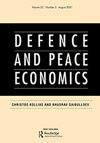解放的战争之犬:对现代总统使用武力缺乏约束的考察
IF 1.6
3区 经济学
Q2 ECONOMICS
引用次数: 0
摘要
摘要对总统在外交政策问题上面临的制约因素的研究通常认为,他们在很大程度上可以随心所欲。然而,一些研究认为,国会对行政部门的限制实际上比人们想象的要大得多。以他们的研究为出发点,我重新审视了这件事,询问总统何时会寻求国会对使用武力的事先授权。我通过观察美国发起的至少有一人死亡的军事化州际争端来估计国会限制对总统的潜在影响。这样做表明,国会在这方面不存在任何约束;总统很少寻求事先授权使用武力,因此在使用武力方面没有受到真正的限制。事实上,有证据表明,发动战争的转移注意力理论可能成立;本文显示,通货膨胀与国会事先授权使用武力存在负面联系。总统似乎不太可能在通货膨胀率高的时候请求国会批准进行致命的军事行动。本文章由计算机程序翻译,如有差异,请以英文原文为准。
An Unchained Dog of War: An Examination of the Lack of Constraint on Presidential Uses of Force in the Modern Era
ABSTRACT Research on the constraint President’s face in matters of foreign policy is generally of the view that they are largely free to do as they please. Some research however posits that Congressional constrain on the executive is in fact much larger than it is given credit for. Using their research as a jumping off point, I re-examine this matter by asking when the President will seek ex ante Congressional authorization for the use of force. I estimate this potential effect of Congressional constraint on the President by looking at US initiated militarized interstate disputes with at least one fatality. In so doing, it is demonstrated that no Congressional constrain exists in this regard; the President rarely seeks ex ante authorization for the use of force and is therefore not truly constrained in its use. In fact, evidence is brought to bear that if anything the diversionary theory of war initiation may hold water; inflation is shown herein to be negatively linked to ex ante Congressional authorization for the use of force. It seems as though the President is less likely to ask Congress for permission to conduct deadly military operations when inflation is high.
求助全文
通过发布文献求助,成功后即可免费获取论文全文。
去求助
来源期刊

Defence and Peace Economics
ECONOMICS-
CiteScore
4.00
自引率
18.80%
发文量
45
期刊介绍:
Defence and Peace Economics embraces all aspects of the economics of defence, disarmament, conversion and peace. Examples include the study of alliances and burden-sharing; military spending in developed and developing nations; arms races; terrorism; country surveys; the impact of disarmament on employment and unemployment; the prospects for conversion and the role of public policy in assisting the transition; the costs and benefits of arms control regimes; the arms trade; economic sanctions; the role of the United Nations.
 求助内容:
求助内容: 应助结果提醒方式:
应助结果提醒方式:


